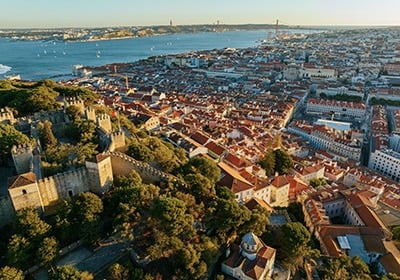Updated: December 15, 2025
Portugal is a popular destination for families, retirees, investors, and digital nomads. The country offers a high quality of life, low crime rates, a warm climate, and economic advantages.
The cost of living in Portugal varies by region, but overall, it is more affordable than in many Western European countries, mainly Germany, France, the United Kingdom, and the Netherlands. A single person can live comfortably on €670 ($779) to €1,200 ($1,393) per month without rent.
Housing costs are the primary expense, with Lisbon and Porto standing out as the most expensive cities for renters in the country. However, if you choose to live in smaller cities, like Braga or Coimbra, or move more to rural and inland areas, you can drastically reduce your monthly expenses.
Below you can compare the cost of living in Portugal vs USA, the UK, and other countries, including average wages, housing costs, and other expenses.
Stick around to read about:
Key Takeaways about the Living Costs in Portugal
- The cost of living in Portugal is significantly cheaper than in many countries in Western Europe and the United States, with estimated monthly costs of €670 for a single person and €2,400 for a family of four, excluding rent.
- Housing takes up most of the monthly expenses, especially if you live in the Lisbon or Porto metropolitan area.
- Portugal offers better rental prices for your dollar per square meter. Rent in Portugal is 39.4 percent cheaper than in the United States.
- Taxes in mainland Portugal primarily affect daily costs through the Value Added Tax (VAT), which is levied at rates of 6, 13, or 23 percent. It's included every time you buy groceries, dine out, take a taxi, or purchase a consumer item.
Average Cost of Living in Portugal
Everyday living expenses in Portugal are generally lower than in most Western European countries, the US. When it comes to overall affordabilty, the cost of living is around 33 percent lower in Portugal compared with the US, although prices have been rising in recent years in Portugal.
Household Type | Monthly Costs (€) | Monthly Costs ($) |
Single person | €670 – €1,200 | $779 – $1,393 |
Couple | €1,800 – €2,500 | $2,090 – $2,902 |
Family of four | €2,400 – €3,500 | $2,786 – $4,063 |
The above prices are excluding rent or housing costs. The total monthly expenses will vary based on location and lifestyle choices.
Portugal stands out as one of the rare countries where expats consistently rate the quality of life as exceptionally high. Portugal ranks 12th, while the United States comes in the 35th position in the Global Intelligence Unit’s (GIU) Quality of Living Index, published by Global Citizen Solutions.
Housing is the largest expense, with rent prices in Portugal 39.4 percent lower than in the US, 21.5 percent lower than in the UK, and 0.3 percent lower than in Germany.
 Is Portugal expensive?
Is Portugal expensive?
Portugal is not considered an expensive country, especially when compared to other Western European countries. According to the Numbeo Cost of Living Index, Portugal ranks 28th, making it a more affordable place to live than Switzerland, Iceland, Norway, and Denmark.
However, the average cost of living in Portugal depends on where you live. For example, for locals earning an average salary, the housing costs in the Porto and Lisbon metropolitan areas can make daily life feel expensive.
Expats and retirees often find Portugal relatively budget-friendly, especially if they have foreign income or pensions. Smaller towns and rural areas offer housing at a fraction of the cost of other EU countries. You can enjoy excellent safety, a warm climate, and a great quality of life in Portugal.
Monthly Costs of Living in Portugal vs USA
Overall, Portugal is far more affordable than the United States. Everyday living costs are 29.4 percent lower, restaurant prices are 37.5 percent less, and grocery prices are around 37.3 percent cheaper.
However, there is a big difference in purchasing power. If you are moving to Portugal with an income earned in the US, such as a pension, investment income, or a remote US salary, you can buy more for lower prices.
If you plan to earn a minimum wage in Portugal, you will find that the lower salaries mean you may struggle to maintain a high standard of living, despite the low prices. Portugal living cost per month are higher in cities such as Lisbon, Porto, and Faro. Read our guide on the cost of living in Cascais to find out more.
Here is a sample monthly budget for living in Portugal vs USA.
Expenses | Portugal | United States |
Meal at an inexpensive restaurant | €11.00 ($12.75) | €17.25 ($20.00) |
Meal for two at a mid-range restaurant | €45.00 ($52.18) | €65.54 ($75.99) |
Draft domestic beer (0.5 liter) | €2.50 ($2.90) | €5.17 ($6.00) |
Cappuccino (regular) | €1.81 ($2.10) | €4.58 ($5.31) |
Fresh loaf of bread (500 g) | €1.41 ($1.64) | €3.16 ($3.67) |
White rice (1 kg) | €1.42 ($1.65) | €3.96 ($4.59) |
Source: Numbeo
Rent prices
Rent prices in Portugal are 39.4 percent lower than in the United States.
For a one-bedroom apartment, you can spend about €896 ($1,040) per month on rent in the city center or €716 ($831) per month outside the center.
Renting a three-bedroom apartment in Portugal can cost approximately €1,592 ($1,847) per month in the city center or €1,184 ($1,374) outside the city center.
Expenses | Portugal | United States |
One-bedroom apartment in the city center | €896.21 ($1,039.17) | €1,490.30 ($1,728.02) |
One-bedroom apartment outside the city center | €716.52 ($830.81) | €1,231.84 ($1,428.33) |
Three-bedroom apartment in the city center | €1,592.41 ($1,846.41) | €2,464.55 ($2,857.67) |
Three-bedroom apartment outside the city center | €1,184.94 ($1,373.96) | €2,058.16 ($2,386.46) |
Source: Numbeo
Rent by location: Lisbon vs. Porto vs. Rural Areas
As housing will be your largest monthly expense, below we provide a location comparison.
- Lisbon (city center): Rent for a one-bedroom apartment is around €1,400.
- Porto (city center): Rent for a one-bedroom apartment is around €1,043.
- Smaller towns and rural areas: Can be below €500 for a small apartment, depending on the location.
Buying property
 According to Eurostat data in the first half of 2025, Portugal registered the highest annual house price growth in the European Union. Portugal property prices went up by +16.3 percent, exceeding the EU average.
According to Eurostat data in the first half of 2025, Portugal registered the highest annual house price growth in the European Union. Portugal property prices went up by +16.3 percent, exceeding the EU average.
But, they remain fairly affordable than many Western European countries. The average price of Portugal real estate varies from €1,903 ($2,209) to €4,935 ($5,730) per square meter, depending on the location.
Lisbon and Porto often have the highest house prices in Portugal, especially in the city center. For example, the average asking price in Lisbon city is €6,934 ($8,050) per square meter compared to the €4,935 ($5,730) in the metropolitan area.
In Porto city, prices stood at €4,883 ($5,670) per square meter versus €3,937 ($4,570) in the metro area. You can read more about Portugal housing costs in our ultimate guide to Porto vs Lisbon property market.
When buying property in Portugal, keep in mind that a typical apartment is significantly smaller compared to those in the United States. For those who prefer larger real estate with more space, it is better to focus on Portugal’s rural and inland areas.
Groceries
 The price of goods in Portugal is significantly cheaper than in the United States, especially if you buy fresh produce at a farmer’s market. You are going to spend about 37.3 percent less on groceries compared to the US.
The price of goods in Portugal is significantly cheaper than in the United States, especially if you buy fresh produce at a farmer’s market. You are going to spend about 37.3 percent less on groceries compared to the US.
For example, one kilogram of apples costs €1.95 ($2.26) in Portugal, while the exact product costs €4.53 in the US. For half a kilogram of fresh white bread, you can spend an average of €1.41 ($1.64), whereas a dozen eggs cost €2.79 ($3.24).
The table below can help you compare the cost of living in Portugal in US dollars and Euros.
Expenses | Portugal | United States |
Eggs (12, large-sized) | €2.79 ($3.24) | €3.80 ($4.40) |
Local cheese (1 kg) | €10.27 ($11.91) | €11.24 ($13.03) |
Chicken fillets (1 kg) | €6.65 ($7.71) | €10.58 ($12.27) |
Apples (1 kg) | €1.95 ($2.26) | €4.53 ($5.25) |
Bananas (1 kg) | €1.29 ($1.50) | €1.45 ($1.68) |
Source: Numbeo
Utilities
When it comes to utilities, the monthly cost of living in Portugal is relatively affordable.
If you live in an 85 square meter apartment, you can spend about €114 ($132) on basic utility costs, such as cooling, heating, electricity, water, and garbage collection. A standard phone bill with 10GB+ data costs just over €18 ($20.90), and 60 Mbps internet packages cost more than €36 ($41.79) per month.
Are you stuck on sorting the utilities? We have a separate FAQ section that can answer all your questions when it comes to setting up utilities in Portugal.
Eating out
Eating out in Portugal is very affordable. A meal at an inexpensive restaurant usually costs around €11 ($12.77), while a three-course dinner for two at a mid-range restaurant is about €45 ($52.24). Fast food is even cheaper, with a combo meal costing around €8 ($9.29).
If you prefer a cup of coffee to start your day, a regular cappuccino costs approximately €1.81 ($2.10), while a small bottle of water typically costs €1.20 ($1.39). Those who prefer to cut back on Portugal living expenses per month tend to avoid eating out too often and cook meals at home.
Sports and leisure
Going out in Portugal doesn’t have to break the bank. Obtaining a gym membership can cost approximately €38 ($44.11) per month. If you enjoy racket sports, you can rent a tennis court for about €15 ($17.41) for an hour on a weekend, or you can watch a movie at the cinema for almost €8 ($9.29) per ticket.
Education
 The cost of education depends heavily on the level and type of institution. Public school (basic or secondary) is free to all residents and Portuguese citizens. Parents usually only pay for school meals and sometimes for extended hours or activities.
The cost of education depends heavily on the level and type of institution. Public school (basic or secondary) is free to all residents and Portuguese citizens. Parents usually only pay for school meals and sometimes for extended hours or activities.
When it comes to the cost of childcare in Portugal, enrolling a child in a private full-day preschool or kindergarten typically requires a monthly fee of around €447 ($519). For an older child, the cost of an international primary school can be quite expensive, about €10,550 ($12,247) annually.
A public university in Portugal is very affordable. Annual tuition fees for EU or EEA students range from €700 ($813) to €1,200 ($1,393) per year for Bachelor’s degrees. Tuition rates are higher for non-EU/EEA students, ranging from €3,000 ($3,483) to €6,000 ($6,965) per year, depending on the Portuguese universities.
Private international schools in Portugal remain quite cheap compared to those in the US and other European countries. You can find them in Lisbon, Porto, and the Algarve, with prices ranging from €10,000 ($11,609) to over €20,000 ($23,218) per year. Choosing private schools can significantly increase the Portugal living cost per month.
Public transportation
If you rely on public transport, you can significantly reduce the cost of living in Portugal per month. A one-way ticket on local transport costs around €2 ($2.32), but the best value for regular travel is the monthly pass for public transport, which costs about €40 ($46.44) and usually covers an entire metropolitan area. However, if you’re planning a longer journey, a cross-country train ticket between Lisbon and Porto typically costs between €29.44 ($34.17) and €35.99 ($41.78).
While taxis are readily available with a standard starting tariff of €3.50 ($4.06), car ownership is relatively expensive, as a single liter of gasoline costs approximately €1.71 ($1.99) due to high taxes.
If you are planning to live near the Atlantic Ocean, in between Lisbon and Port, read our article on the cost of living in Portugal’s Silver Coast.
Healthcare costs
 Portugal has a public healthcare system also known as Serviço Nacional de Saúde (SNS). The SNS is a tax-funded government system known for high-quality care.
Portugal has a public healthcare system also known as Serviço Nacional de Saúde (SNS). The SNS is a tax-funded government system known for high-quality care.
Portugal healthcare is almost free for all legal residents and Portuguese citizens, including expats. Most essential medical services, including doctor visits, hospital stays, and emergency care, are free at the point of use or require only a small co-payment of €5 ($5.80) to €20 ($23.22).
Some of the most notable centers for public healthcare include Central Lisbon University Hospital Centre, Porto University Hospital Centre, and Coimbra Hospital and University Centre.
According to the latest ranking of the world’s health systems by the World Health Organization, Portugal ranks 12th. Portugal also ranks 23rd in the world on the 2024 World Index of Healthcare Innovation.
Private health insurance in Portugal
Many retirees, expats, and remote workers opt for private health insurance to supplement the public system, gaining faster access to English-speaking doctors, shorter wait times, and coverage for services that the public system often excludes, such as routine dental and vision care.
Private insurance is considered affordable compared to North America or the UK. Premiums for a healthy young adult start as low as €20 ($23.22) to €40 ($46.44) per month, while comprehensive plans for older adults may range from €100 ($116.09) to €180 ($208.97) or more per month, depending on the coverage. While in the US, the same type of premium can cost €344 ($400) to €861 ($1,000).
Taxes & mandatory payments
 Portugal’s monthly costs are also shaped by a few key taxes and mandatory payments. The main one most people notice is VAT (Value Added Tax), which is added to almost all goods and services. The rates vary from 6, 13, to 23 percent.
Portugal’s monthly costs are also shaped by a few key taxes and mandatory payments. The main one most people notice is VAT (Value Added Tax), which is added to almost all goods and services. The rates vary from 6, 13, to 23 percent.
If you earn income in Portugal, you’ll also pay personal income tax, which varies depending on your earnings and is deducted from your salary each month. If you earn more, you pay higher taxes in Portugal.
Employees are required to contribute to social security, which provides coverage for healthcare, pensions, and unemployment benefits. These factors directly affect take-home pay and overall living costs, so it’s important to factor them into your monthly budget.
Cost of Living in Portugal vs US: Comparing Capital Cities
As the capital city of Portugal, Lisbon commands the highest property prices in the country. However, Lisbon real estate investment remains significantly more affordable than in Washington, DC.
Lisbon’s prices for luxury properties are competitive with, and often lower than, those in major US capital cities like Washington, D.C., and are drastically more affordable than in cities like New York or San Francisco.
Comparing monthly expenses in Portugal vs USA:
- Overall living costs in Lisbon are 37.9 percent lower than in Washington, DC (without rent)
- Overall living costs in Lisbon are 41.1 percent lower than in Washington, DC (with rent)
- Rent prices in Lisbon are 46.0 percent lower than in Washington, DC
- Restaurant prices in Lisbon are 47.3 percent lower than in Washington, DC
- Grocery prices in Lisbon are 44.0 percent lower than in Washington, DC
Our article provides a more detailed comparison of the cost of living in Portugal vs USA.
Cost of living in Portugal for international students
Lisbon can provide a budget-friendly experience for international students compared to many other European capitals. The total monthly expenses are approximately €775 ($900) without including the cost for tuition.
The highest cost is accommodation, where renting a studio or a shared apartment averages €350 ($406) to €500 ($580). However, the monthly rent for a one-bedroom apartment can easily exceed €700 ($813). When it comes to daily expenses, international students can live on a tight budget of about €150 ($174) for groceries and enjoy affordable meals out for €10 ($11.61) to €15 ($17.41).
Cost of living in Portugal for a single person
A single person living in Portugal typically spends between €670 ($778) and €1,200 ($1,393) per month, without including rent. However, to live a more comfortable life in major cities like Lisbon or Porto alone, it is advisable to have a monthly budget of around €1,750 ($2,032) to €2,350 ($2,728).
Cost of living in Portugal for a family of four
A family of four can expect to spend approximately €2,400 ($2,787) per month, excluding rent costs. A mid-range meal for four can cost about €90 ($104.49), and the cost of groceries can reach €500 ($581) to €700 ($813) or more per month. However, the total costs will vary significantly based on your location, lifestyle, and preferences.
The Algarve and Madeira are popular tourist destinations with lucrative opportunities for Portugal luxury real estate investments. By moving inland or further away from coastal areas and city centers, you can save money.
Cost of living in Portugal for retirees
 Planning to retire in Portugal? The country offers many advantages, such as access to waterfront properties, universal healthcare, a high quality of life, and excellent safety standards.
Planning to retire in Portugal? The country offers many advantages, such as access to waterfront properties, universal healthcare, a high quality of life, and excellent safety standards.
Retirees, mainly those who own real estate, can live comfortably on a €1,500 ($1,741) to €2,000 ($2,322) monthly budget in coastal towns or smaller cities, where the costs of housing tend to be lower. The cost of living in Portugal for retirees varies based on the location and lifestyle.
To find out, check our comprehensive guide to the best retirement communities in Portugal.
Comparing Rent Prices in Portugal's Major Cities
The cost of living in Portugal for a single person with rent drastically varies by location. Central Portugal is considered cheaper to live in than Northern Portugal, mainly inland. Northern Portugal is home to Porto, the country’s second-largest city, which is significantly more expensive than the smaller cities in the center. The interior and affordable cities of Central Portugal, such as Coimbra, Viseu, or Castelo Branco, consistently offer some of the best value in the country, with housing costs often being much lower.
Lisbon
- One-bedroom apartment in the city center: €1,371 ($1,592) per month
- One-bedroom apartment outside the city center: €1,048 ($1,217) per month
- Three-bedroom apartment in the city center: €2,524 ($2,930) per month
- Three-bedroom apartment outside the city center: €1,684 ($1,955) per month
Porto
- One-bedroom apartment in the city center: €1,039 ($1,206) per month
- One-bedroom apartment outside the city center: €788 ($915) per month
- Three-bedroom apartment in the city center: €1,865 ($2,166) per month
- Three-bedroom apartment outside the city center: €1,420 ($1,649) per month
Braga
- One-bedroom apartment in the city center: €789 ($916) per month
- One-bedroom apartment outside the city center: €591 ($686) per month
- Three-bedroom apartment in the city center: €1,227 ($1,425) per month
- Three-bedroom apartment outside the city center: €944 ($1,096) per month
Coimbra
- One-bedroom apartment in the city center: €732 ($850) per month
- One-bedroom apartment outside the city center: €485 ($563) per month
- Three-bedroom apartment in the city center: €1,357 ($1,576) per month
- Three-bedroom apartment outside the city center: €966 ($1,122) per month
Faro
- One-bedroom apartment in the city center: €983 ($1,141) per month
- One-bedroom apartment outside the city center: €716 ($832) per month
- Three-bedroom apartment in the city center: €1,666 ($1,934) per month
- Three-bedroom apartment outside the city center: €1,333 ($1,547) per month
Funchal
- One-bedroom apartment in the city center: €1,350 ($1,567) per month
- One-bedroom apartment outside the city center: €1,024 ($1,189) per month
- Three-bedroom apartment in the city center: €2,228 ($2,586) per month
- Three-bedroom apartment outside the city center: €1,550 ($1,800) per month
Comparing Income, Wages, and Minimum Salary in Portugal with Other Countries
 The average income in Portugal, €1,707 ($1,983) per month, is significantly lower than in the United States. A significant portion of Portuguese workers earn more than the average minimum wage, particularly in high-demand fields such as healthcare, IT, finance, engineering, and accounting.
The average income in Portugal, €1,707 ($1,983) per month, is significantly lower than in the United States. A significant portion of Portuguese workers earn more than the average minimum wage, particularly in high-demand fields such as healthcare, IT, finance, engineering, and accounting.
As of January 1, 2025, the minimum wage in Portugal is €870 ($1,010) per month, or €10,520 ($12,217) per year.
For many jobs, especially outside of Lisbon and Porto, you can expect to earn a gross salary around the €1,000 ($1,161) to €1,500 ($1,742) per month range.
These often include fields such as retail and sales, hospitality, and tourism. If you are interested in boosting your passive income from rentals, check our detailed guide for renting out your property in Portugal.
The table below compares the average monthly salaries in Portugal with those in other countries.
Country | Average monthly salary |
Portugal | €1,707 ($1,982) |
United States | €4,496 ($4,952) |
United Kingdom | €3,358 ($3,898) |
Spain | €2,522 ($2,927) |
Cost of Moving to Portugal
 When you are moving to Portugal from the USA or any other country, you will face three main expenses: meeting the visa requirements, securing accommodation, and covering the costs of moving or shipping.
When you are moving to Portugal from the USA or any other country, you will face three main expenses: meeting the visa requirements, securing accommodation, and covering the costs of moving or shipping.
The Portugal D7 Visa (passive income) and Digital Nomad Visa (D8) require you to prove financial stability. With the D7 Visa, you need a passive income of at least €870 ($1,010) per month and a deposit or savings of €10,440 ($12,120) in your Portuguese bank account. The D8 Visa requires proof of remote work and income that is at least four times the minimum wage or €3,480 ($4,040) per month. You also pay additional fees depending on the application.
Before you move, you must secure an accommodation. A buyer’s agent or a property finder in Portugal can help you research the local market and find a suitable place to live. They can scour local listings or off-market properties, so you can settle in your dream home.
Shipping costs vary based on the number of products or services you want to transfer. For example, shipping furniture from a one-bedroom apartment in the United States to Portugal can cost anywhere from €2,800 ($3,251) to €5,000 ($5,806). A one-way plane ticket can cost between €400 ($464) and €1,200 ($1,393) per person, but this price range may vary.
If you are from California, check our guide on moving from California to Portugal.
 Cheapest cities to live in Portugal for expats
Cheapest cities to live in Portugal for expats
The cost of living in Portugal with rent is more affordable in cities like Braga and Coimbra. However, if you prefer to purchase your own property, it is best to move inland and farther away from major cities.
According to INE Portugal (National Statistics Institute), the cheapest districts to buy a house in Portugal are: Coimbra, Bragança, Castelo Branco, Vila Real, Viseu, and Guarda. Santarém real estate is also a cheap option to buy a home.
You can buy a house for €30,000 ($34,835) or less in:
- Figueira de Castelo Rodrigo (Guarda district).
- Sernancelhe (Viseu district)
- Almeida (Guarda district)
- Vimioso (Bragança district)
These districts can reduce the cost of living for expats in Portugal by 30 to 50 percent compared to Lisbon or Porto. Check our article for more information on the cost of living in Guarda.
If you’re considering a move to Portugal, our partner, Global Citizen Solutions (GCS), will be able to offer you expert advice and guidance on your journey to obtaining Portuguese residency. GCS is a multidisciplinary firm offering bespoke residence and citizenship solutions in Europe and the Caribbean.
Portugal Cost of Living 2025: Practical Tips
 To make things easier for you, we have outlined some practical tips below to help you settle in Portugal.
To make things easier for you, we have outlined some practical tips below to help you settle in Portugal.
- Saving money: Depending on where you are moving from, take a note of your grocery expenses, carefully pay attention to utility costs, and general living expenses. This will help you identify which aspects of life are considered expensive and which are more affordable. This will help you budget and save in the future.
- Settling in costs: When moving to another country, there will always be unexpected costs that will crop up. Whether it is transporting your belongings to Portugal or taking stock of utilities, don’t stress too much about the initial moving costs. Simply try to factor them in and budget accordingly. Having a checklist here can be of great help, as it will keep you aware of potential costs that could accumulate.
- Tax implications: If you are buying property, factor in the property taxes that you’ll need to pay at the time of purchase, IMT (Property Transfer Tax), and stamp duty. For more information, please refer to our article on property taxes in Portugal.
- Research the local market: Whether you are interested in buying or renting properties, you can consult with a buyer’s agent or a real estate agent in Portugal. They can provide the latest market insight, property prices, and neighborhood trends.
How can Goldcrest help you?
At Goldcrest, we are a team of buyer’s agents. We offer expert insight, analysis, and professional guidance across the Portuguese real estate market. Instead of navigating listings, paperwork, and negotiations on your own, we handle the entire process for you.
We help you find the right property, verify its true value, coordinate viewings, check legal risks, and negotiate the best possible price. Our primary goal is to protect your interests, not those of the seller, so that you can buy with confidence.
If you’re ready to make your property search easier and more efficient, contact us today. Let us help you find the home or investment that truly fits your goals.
Frequently Asked Questions about Cost of Living in Portugal
Is it cheap to live in Portugal?
Living in Portugal is cheap compared to most Western European countries. You get great value for your money because housing, food, and transportation costs are all surprisingly inexpensive. Average living expenses for a single person, including rent, range from €1,200 ($1,393) to €2,500 ($2,903) per month, depending on the city.
Can you live in Portugal on $2000 a month?
Yes, you can live in Portugal on $2,000 (€1,723) a month, particularly outside major cities, such as Lisbon and Porto.
How much money do you need to live in Portugal?
Portugal has one of the lowest costs of living in Western Europe, where a couple can enjoy a comfortable lifestyle for between €1,700 ($1,974) and €3,000 ($3,483) per month, depending on their chosen location, rent, personal lifestyle, and spending needs.
Is it cheaper to live in Portugal or the USA?
Portugal is a much cheaper country to live in than the USA, especially when you are paying for housing, healthcare, education, or other daily expenses.
What is the cost of living in Portugal for a couple?
A couple can live comfortably in Portugal on between €1,700 ($1,974) and €3,000 ($3,484) per month, depending on the location and lifestyle, with rent. Lisbon and Porto are pricier, although still fairly affordable compared to other European destinations.
How much is rent in Portugal in US dollars?
Rent prices in Portugal are around 40 percent lower than in the USA. The cost of rent in Portugal in US dollars is $1,039 (€896) for a single-bedroom city center apartment, while a single-bedroom apartment outside a city center costs $830 (€716). Please note that this is the national average, and prices will vary significantly depending on the region within Portugal.
Is it possible to live in Portugal on $3,000 a month?
Yes, it’s possible to live comfortably in Portugal on $3,000 (€2,584) a month, but this will depend on your lifestyle and location. Typically, this budget covers basic needs like accommodation, food, transport, and utilities. However, pricier regions might demand stricter financial planning to maintain a comfortable standard of living.